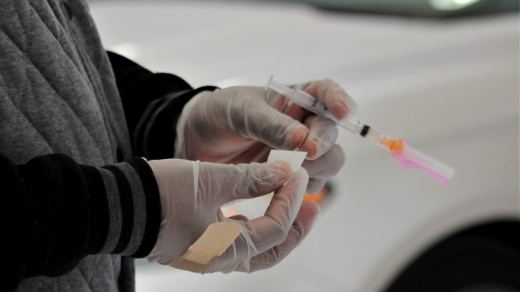Most recently, booster shots for the Pfizer and Moderna vaccines have been made available as well as monoclonal antibody infusions.
Clifford Simmang is the chief medical officer at Baylor Scott & White Medical Center-Grapevine as well as regional CMO for the health care provider's west region. According to him, the main difference between a booster shot and an infusion is how each treatment reacts with your body’s natural immune response.
Simmang said a vaccine—including the booster shot—helps the body build an immune response to the virus, which allows the body to see the virus as a threat and fight against it if the person is infected. A vaccine takes time to become effective and is more of a preventive measure.
An antibody infusion, on the other hand, offers more immediate protection that mimics your body’s natural immune response to the virus. Unlike the vaccine, which protects someone from getting sick if they do catch the virus, Simmang said the antibody infusion helps fight the symptoms a patient would experience while sick, preventing them from getting worse.
“The vaccine is something that's designed to work over a long time to provide you immunity and protection,” Simmang said. “The monoclonal antibody is specifically designed and manufactured to give you a more immediate immunity and protection, and that's why it's important you get it early [after becoming infected].”
Health officials recommend patients come for an infusion, should they need it, no more than 10 days after testing positive for COVID-19. Infusions are available for high-risk populations, such as those over the age of 65 and people who are immunocompromised or have diabetes, hypertension and other similar conditions.
“Again, this isn't a treatment, so it's not a viral treatment. It's a viral protection, and so you got to get [the infusion] before [the virus] really takes hold of you. So the earlier the better as far as getting the monoclonal antibody,” Simmang said.
There are two state-run antibody infusion centers in North Texas. One is in Tarrant County at Cook Children’s Medical Center in Fort Worth, located on 801 Seventh Ave. The second one is at Collin College at the McKinney Campus Conference Center, located at 2400 Community Ave. in McKinney. Appointments are required, and there is no cost to the patient or the health care provider.
Infusions may also be offered at your local hospital, although fees may apply.
Simmang said although it is recommended vaccinated individuals do get their booster shot eventually, they should at least wait six months before getting it, and it should be the same brand as the original shot.
“We do know that the antibodies are different between having had [COVID-19] and those naturally protective antibodies and the antibodies produced by the vaccine,” Simmang said. “The count seem to be higher by the antibodies produced by the vaccine, but they can be a little bit different pathways.”
Booster shots may be available at a local pharmacy or health care provider. Patients will have to show their vaccination card to get the booster, which remains free of cost.
As of Oct. 6, Trauma Service Area E—which includes all of North Texas—has 2,017 total hospitalized COVID-19 patients, according to the Dallas-Fort Worth Hospital Council. There are 57 available adult intensive care unit beds in the area.





